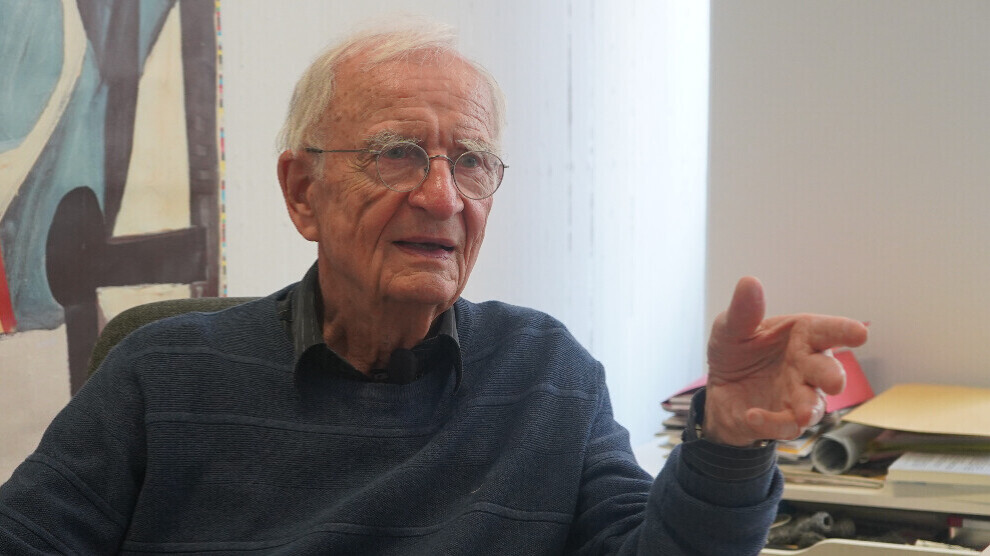Paech: Isolation is contrary to international law
International lawyer Norman Paech is one of the signatories of an appeal demanding the CPT to intervene against Abdullah Öcalan's solitary confinement.
International lawyer Norman Paech is one of the signatories of an appeal demanding the CPT to intervene against Abdullah Öcalan's solitary confinement.

International lawyer Norman Paech is one of the signatories of an appeal demanding the CPT to intervene against Abdullah Öcalan's solitary confinement.
Over a hundreds of public figures and politicians recently wrote to the Council of Europe's Anti-Torture Committee (CPT) and urgently called for clarification of Abdullah Öcalan's situation.
Öcalan has been held as a political hostage on the prison island of Imrali since he was abducted from Kenya to Turkey 25 years ago in violation of international law - most of the time in isolation. The 75-year-old last received a visit from a lawyer in 2019, while his last family visit took place in 2020. In March 2021, a wave of international protests made it possible for Öcalan to have a telephone conversation with his brother. However, this was interrupted after a few minutes for unknown reasons. Since then, there has been no sign of life from Öcalan.
The signatories of the open letter describe these prison conditions as "violating human rights and inhumane" and speak of "isolation torture" to which Öcalan is subjected. They call on the CPT to take action and send a delegation to Imrali to investigate Öcalan's situation and find out about his well-being.
This is also the demand of Professor Dr. Norman Paech, emeritus international lawyer and author from Hamburg, who is one of the signatories of the appeal. In an interview with ANF, Paech described Öcalan's situation as completely illegal. "According to the categories of international law, such total isolation is contrary to international law," he said. He criticized the fact that the CPT, which in the past itself spoke out against the current prison conditions on Imrali, does not enforce its own decisions.
According to Paech, the EU is also responsible for Öcalan's situation because it is not helping to ensure that Ankara implements the decisions of its bodies. "But you know: Erdogan and above all Turkey are extremely politically important for the West for a number of reasons. On the one hand because of NATO, but on the other hand because Turkey acts as a barrier against refugees, be it from Afghanistan or Syria. And no one dares to put Erdogan under pressure. That is the big problem. Because this isolation actually is a reaction to the political influence that Abdullah Öcalan still has in the Kurdish community, even though no one can hear or see him. And they fear that, they want to eliminate that. They do not want to deviate from their position of isolation and separation of the Kurdish people, so to speak. That is the background. And the EU is currently unable and unwilling to stand up for Öcalan and, in fact, for international law.”
In addition to the CPT, there is another committee whose task it is to ensure at the international level that torture does not occur and is prevented from the outset. The “Subcommittee on Prevention for Torture” (SPT) is a body of the United Nations. The name of the institution has often been mentioned in the past in connection with WikiLeaks founder Julian Assange, but not because of Öcalan's prison conditions. Norman Paech believed that this is because "the political position of the PKK in Europe is still that it is viewed as a terrorist organization." He considered this wrong and pointed to a 2020 ruling by the Belgian Court of Cassation, according to which the PKK is not a “terrorist organization” but a party in an armed conflict. "There needs to be a political shift that consists in calling the PKK for what it is. Namely, a political party that wants nothing other than autonomy and self-government for the people. And these are demands that can be implemented in any democratic state."
Compared to other EU countries, Germany is probably furthest removed from the change of course regarding the PKK that took place after the ruling of the highest appeals court in Belgium. The country is considered a pioneer of anti-Kurdish criminalization. Norman Paech said that this is a "very disastrous policy. It does not correspond to the political facts and is linked to German-Turkish relations, including in the rest of Europe. European governments are indebted to Erdoğan because of the sealing off of the borders to prevent refugees from migrating. They are not only paying him billions, but are also fulfilling his political wishes. We have also seen with the question of Sweden joining NATO that Erdoğan has trump cards in his hand against the PKK and the governments. I think this is the wrong policy. But this is a process that is taking place on a political rather than a legal level. And there would have to be a change in German policy, as in many international areas."
According to Paech, Turkey’s threats to intervene against the Democratic Autonomous Administration in the Region of North and East Syria (DAANES) if local elections were held there as announced were also “absolutely contrary to international law”. Erdoğan and his Foreign Minister Fidan declared in their usual martial manner that they would not allow a "Terroristan" to be established on the Turkish border. "Turkey’s aggression began much earlier, when it invaded Syria and took possession of the Afrin region," said Paech, accusing the Turkish state of "carrying out a demographic change in the occupied areas of northern Syria by driving out the Kurdish population and settling people of Arab descent, including refugees, in their place. All of these actions, as well as the chemical weapons attacks by the Turkish army in northern Iraq and South Kurdistan, are in complete contradiction to international humanitarian law. Nevertheless, they are tolerated by the West and the NATO states, including Germany. And that is the problem."